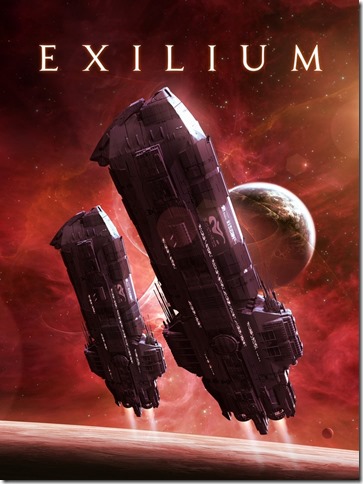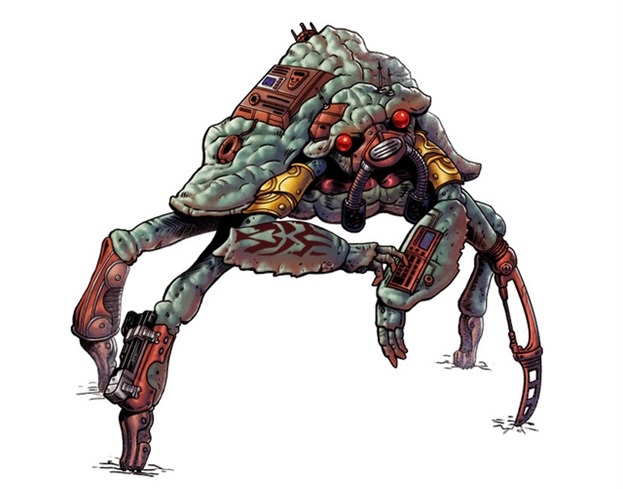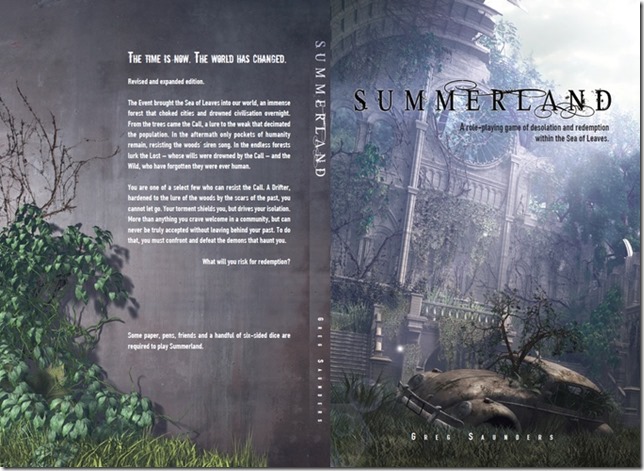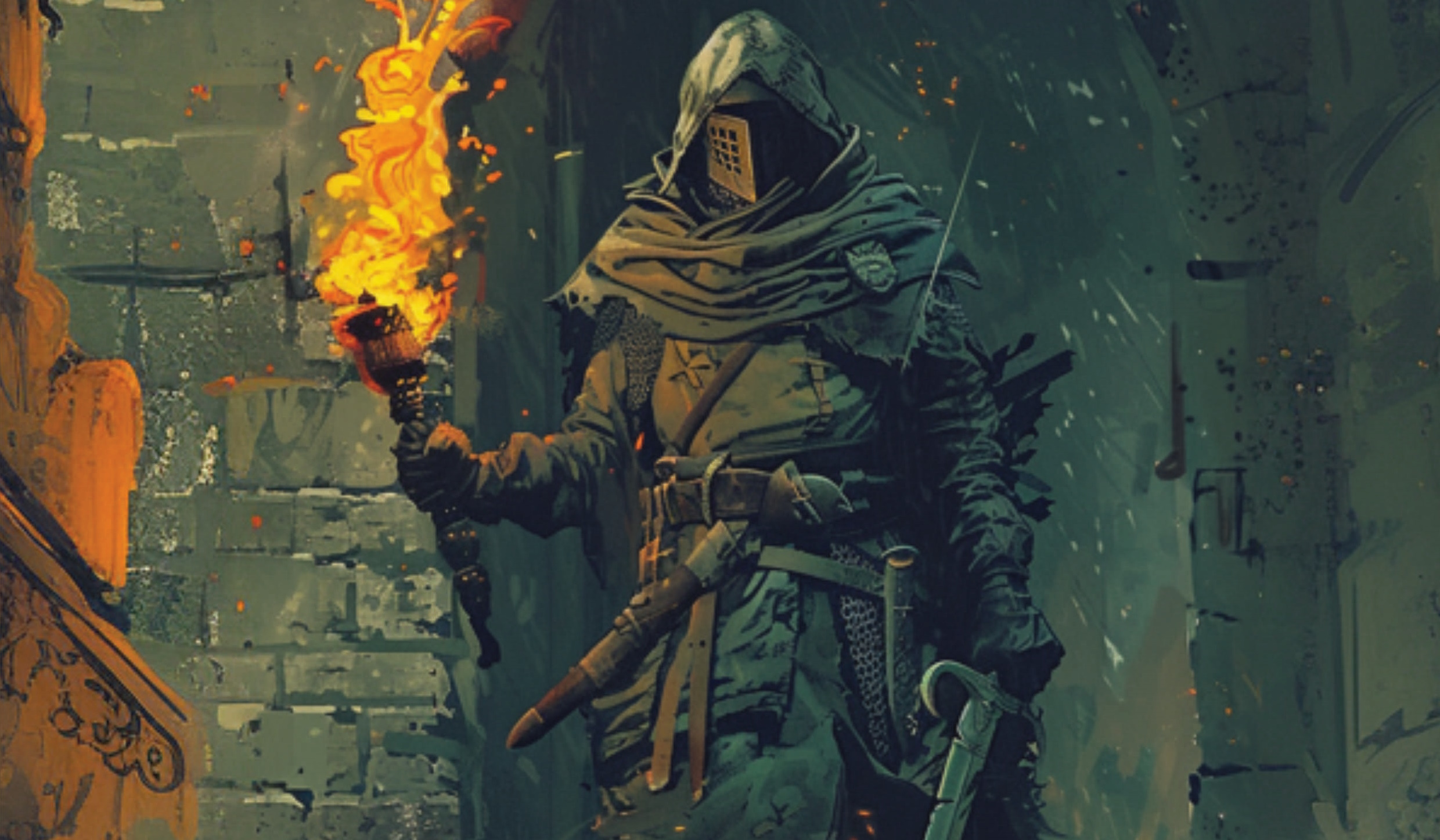Interview: Greg Saunders
About a week ago I wrote about Greg Saunders’ Exilium Kickstarter. Since I was interested in learning more about his new game and the man himself, I asked him to answer a couple of questions. He’re are his answers.
Stargazer: At first I want to thank you for taking your time to answer a few questions for us. So, who is this Greg Saunders anyway? Please tell us a bit about yourself. When did you start playing roleplaying games and what made you writing your own?
Greg: I’m a father of two who’s been playing RPGs for years, since about the age of ten when AD&D was my game. I’ve played a huge number of games, especially in the eighties and nineties, my favourite from my youth being WHFRP and the Enemy Within campaign, and of course CoC. I first started writing games when I didn’t have much time to play them, due to the arrival of my two children! I have a fairly creative streak (I also do some sculpting of miniatures to an amateur level), so it’s an expression of that same desire. The Indie RPG scene really put me on to the idea that mechanics can be used to reinforce themes, and that’s at the core of my writing. Exilium uses an open generic rule set, but it has been adapted to specifically work with the ideas of redemption that drives the narrative of the game.
Stargazer: With this out of the way, let’s have a look at “In Flames” and “Exilium”. You’re currently running a Kickstarter project that is supposed to fund a reimagined version of “In Flames” called “Exilium”. What made you considering creating a new version of the game and can you elaborate on some of the planned changes?
Greg: There are three big changes. The condensing of the three books (core and supplements) into a single book, the full-colour production, and the layout design by Paul Bourne. I’ve worked with Paul before on Summerland, the covers of the various In Flames books and on A/State. Other than that the game remains mainly the same, apart from two changes. One I’ll go into during your next question. The other is that I changed an aspect of characters from In Flames. In the original game, the characters woke up in the Flame Worlds with no knowledge of their past, the post-human mind basically wiped them clean. However, that made the game a little more hard work for the players as they were starting from a base of no in game knowledge. In Exilium, the player characters slowly come to realise they are something different, but still retain their memories, which makes the game easier to get into as the characters in game know a lot of the setting already, if that makes sense!
I’ve also added some extra content across the board, which I feel improves the reading and playing experience of the game
Stargazer: From how I understand it, “In Flames” took some inspiration from Haitian Vodou (commonly known as Voodoo) mythology. In “Exilium” this influence is probably still there, but less obvious (at least from what I’ve read so far). Haitian Voudou and Science Fiction is not a common mix. Can you tell us how you came up with this idea, and why are you toning down the Vodou influences in the reimagined version?
Greg: The idea of Vodou really came to me as a way of explaning what was happeing in In Flames, i.e. the game and concepts came first, the Vodou after! In Exilium, mechanically and spiritually the game is exactly the same. What I did do is remove the overt Vodou references. I did this for two reasons – firstly some people found it slightly off-putting, and secondly some of the names were hard to remember and perhaps not as user-friendly or connected to what they represented as they could be. In Exilium, I’ve replaced the names with others that are easier to understand and that don’t have direct religious undertones. For example, Barons are now Shadows; Ghede is now the Envoy etc. But the core concept of the game remains completely unchanged.
Stargazer: What always intrigued me was that “In Flames” you’re playing someone who once had god-like powers now reduced to normal human levels, trying to atone for a crime, you have no memories of. This provides ample opportunity for roleplaying the internal conflict of the characters, but it might also make the game less accessible to people new to roleplaying games or who prefer a more distanced approach to their characters. What advice can you give to these players and what options are there for non-Exile characters in “Exilium”?
Greg: Really Exilium is based around that concept of a post-human trying to atone for a crime. You could play the game without it, but it is this redemption that drives play and gives you a reason to go out and explore. I think it’s actually less daunting that in might appear, as it is the players themselves who define what Elysium (the Understar in the original In Flames) is and what their crime was. There is no right or wrong description of either, so players can really go to town and have fun in a collaborative way. If people want to ignore all that and play the game as a straight science fiction RPG then of course that’s up to them and it can be played that way, but I’d argue they’d be missing all the fun!
Stargazer: Aside from the changes to the setting, will there also be new material in “Exilium”?
Greg: There are some additions to the mechanics to make things clearer, and some extra ‘fluff’ to add to the feel of the game, but otherwise it’s essentially the same as In Flames plus the two supplements.
Stargazer: “In Flames” used Antipaladin’s MiniSix rules which are basically a simplified version of OpenD6. Will “Exilium” use the same set of rules? And if not, what did you change?
Greg: Yes, it’s a great set of rules and extremely modular, so the rules remain Mini Six in Exilium. I like the fact that various versions of the rules and modules for them are available for free online, so players don’t have to spend money if they want to expand their options. Exilium like In Flames though does have everything needed to play under the covers.
Stargazer: “Exilium” is actually the first Kickstarter project I backed which uses DriveThruRPG as a fulfillment partner. What made you choose this option?
Greg: I went for this option as it’s a win win, a win for customers and a win for me. For me as I have a passion for creating roleplaying games and for producing as beautiful and inspirational books as I can. That means writing the contents and teaming up with artists and graphic designers, experts one and all, to deliver the best possible product.
What I don’t have a passion for is boxing up, shipping and all the related logistics of sending books around the globe. With DriveThruRPG, I don’t have to do that, instead like with other aspects of the project I can’t do myself, such as the art; experts will do it for me.
But much more importantly, it’s a win for customers. They’re hopefully backing this project because you like what they’ve seen. I can tell them about the project, I can show them the art, and I can explain the design. What I can’t do is show anything that would indicate how good I would be at shipping printed books around the globe.
So, if I were handling logistics myself, they’d have to take my word for it. With DriveThruRPG, they don’t have to. They know that the logistics are being handled by experts, so you can forget about that aspect of the project. And so can I!
Stargazer: Several reward levels include a copy of your other game, Summerland. What can you tell us about Summerland? What is it about? What kind of rules does it use?
Greg: Summerland is a post-apocalyptic game of loss and redemption. In this game, the world has suffered the Event – overnight, a forest called the sea of leaves has sprung up and destroyed the works of man. What’s more, many people have been lured into the forest by ‘the call’, a siren song that leads them to disappear, and strange unnatural animals prowl the woods. Players take on the roles of drifters, who are too psychologically damaged by the event to be accepted into any of the remaining settlements. But bizarrely, it is this damage that helps them to resist the call. They are trying to heal this damage and become a normal member of what remains of society. As you can imagine it share some similarities with Exilium in terms of trying to redeem yourself, but it uses a completely different system of my own devising. It’s fairly narrative and rules light however.
Stargazer: Is there anything I forgot to ask you but you’re dying to tell us? Now’s the chance!
Greg: I don’t think so, but I’m sure as soon as I stop typing I’ll think of something!
That concludes our interview with Greg Saunders. If you have any more questions feel free to post them in the comments below or check out the Exilium Kickstarter page.






2 comments